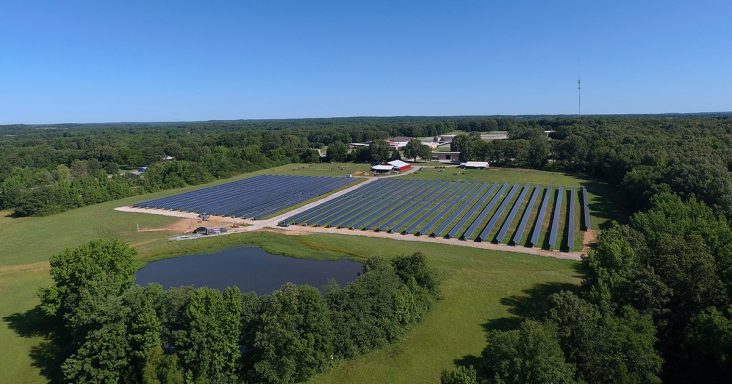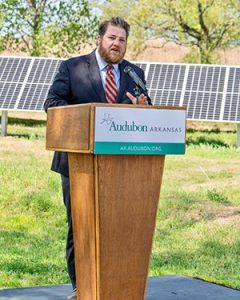Audubon solar plant to meet 100% of Little Rock center’s power demand; solar equipment partnership announced
by April 13, 2021 6:11 pm 957 views

Conservation organization National Audubon Society has become the first nonprofit in Arkansas to be powered by 100% solar energy with its 35-kilowatt solar array at the Little Rock Audubon Center, officials said. Meanwhile, OMCO Solar announced Tuesday (April 13) a partnership with Little Rock-based renewable energy company Entegrity Energy Partners.
The National Audubon Society hosted a ceremony Tuesday for the new array that will meet all of the center’s electricity demand, according to a news release. The center at 4500 Springer Boulevard in Little Rock also will have a Solar Learning Lab that’s geared for kindergarten to 12th-grade students and nonprofit leaders. North Little Rock-based solar power developer Scenic Hill Solar built the plant.
Officials at the ceremony highlighted the importance of the approval of Act 464 and how this project would not have been possible without it. In 2019, Audubon led a coalition to enact the state Solar Access Act, allowing nonprofits to use third-party financing service agreements to monetize federal clean energy tax incentives and provide an opportunity for nonprofits to procure economic solar power.
Gary Moody, state and local climate strategy director for the National Audubon Society, explained the long journey to reach the completion of the array and that the organization needed to do its part to help North American birds.
“For Audubon, this facility is about living our values,” Moody said. “In 2015, we issued the Birds and Climate [Change] Report. It states unequivocally that climate change is the No. 1 threat to North America’s birds. More than half of our species are at risk from changing climate implications. We knew that if we were going to do our job to protect birds and the places they need now and in the future, we’d also have to change how we make and use energy. For us, this wasn’t just a decision to choose solar. It was imperative to help our birds live and thrive.

“We’re also excited to lead by example as the state’s first 100% solar nonprofit,” he added. “We’re installing not just a solar power plant to power our solar needs but also a Solar Learning Lab so that we can share the solar technology with the students that come through the center on field trips and other nonprofit leaders who want to follow in our example and benefit from solar power with their facilities.”
The array will provide a savings of about $10,000 annually for the center to use for education programs and statewide rehabilitation programs, he noted.
Bill Halter, CEO of Scenic Hill Solar, said Act 464 has led to more than $250 million in investments across Arkansas.
“When you look behind and you see this power plant, just imagine that there are literally multiples of this going all around the state of Arkansas, providing local jobs, providing economic development in communities that many times have it tough, [and] providing property tax revenue,” said Halter. “Every kilowatt-hour of electricity generated through solar is a kilowatt-hour that we don’t have to generate through gas, oil or coal.”
Over the next 30 years, the new solar plant at the Little Rock Audubon Center will reduce carbon emissions equal to removing 2.7 million passenger vehicle miles from the highway. Also, the Solar Learning Lab will include the ground-mounted solar facility tied to the center’s electric meter, an indoor interactive educational exhibit on solar technology and two tracks of educational curriculum.
“In order to protect the birds that we love and the places that they need to survive, it is important we do everything we can as an organization to reduce our own carbon emissions,” said Uta Meyer, manager of the Little Rock Audubon Center. “This solar project not only gives us an opportunity to educate the community on the benefits of renewable energy for both people and wildlife, but it also helps ensure we’re part of the solution in everything we do.”
Audubon’s solar project is supported by a 3M Ecogrant and the National Audubon Society’s Maggie Walker Incentive Fund.
“Audubon has been a strong advocate for smart solar policy in Arkansas, and I am pleased to see them now utilize the benefits of Act 464,” said Sen. Dave Wallace, R-Leachville, lead sponsor for the Solar Access Act. “We have seen tremendous economic growth as consumers drive the Arkansas solar market.”
OMCO SOLAR PARTNERSHIP
In the partnership with Entegrity, solar equipment provider OMCO Solar of Phoenix will supply its ORIGIN tracker for 15 megawatts of solar projects in Arkansas, according to a news release. Since 2019, OMCO Solar has provided the tracker system for more than 30 projects in multiple states.
“Achieving more together than we can alone — that’s the power of partnerships, and that’s Entegrity,” said Eric Goodwin, director of business development for OMCO Solar. “Not only are they true experts in driving solar energy adoption across multiple industries, but they are also passionate about enabling a sustainable future. Their desire to create learning opportunities to support the growing solar workforce shows their belief in renewable energy’s future. We look forward to working with Entegrity to complete these projects and more in the future.”
OMCO Solar’s first installation with Entegrity comprised a 1.36-megawatt array for The Cedar Ridge and Midland school districts.
“When we partner with OMCO Solar, we can rest easy knowing that we are providing our customers with a top-notch solution that will also optimally function with components from other leading providers,” said Charles Maddox, director of procurement at Entegrity. “We’ve had some impactful and important opportunities together. We feel confident that OMCO Solar will be long-term partners as we continue designing and implementing solutions that fulfill our mission of creating a more resilient future.”
The ORIGIN tracker provides several benefits, including allowing for long rows of up to 120 modules and eliminating or minimizing gaps over posts, between modules and at row ends. Also, OMCO Solar produces torque tubes, which allows for domestic control of the supply chain with nationwide distribution at a lower cost, the release shows. The torque tube can be one of the most expensive pieces of a tracker system and sometimes be up to 25% of its cost.
